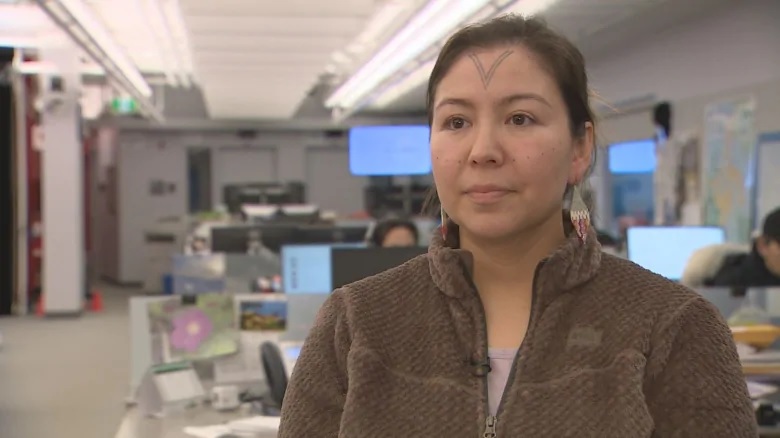Inuit artists criticize Canada’s Green Party leader for opposing commercial seal trade

Two prominent Inuit artists say Canada’s Green Party leader Elizabeth May is being “hypocritical” by claiming to support Indigenous rights while also opposing the commercial seal trade.
Inuk musician Tanya Tagaq and Inuk filmmaker Alethea Arnaquq-Baril say May’s opposition to the commercial seal trade hurts Inuit communities who depend on the pelts for much needed revenue.
“If you are going to be an advocate for environmentalism, I think the worst way to do that is to believe in the propaganda machine that prevents Indigenous people from living and surviving and corners them into non-renewable resource development,” said Tagaq, a Juno and Polaris Prize-winning musician.
“I just think it’s incredibly hypocritical.”
May has repeatedly stated her opposition to the commercial seal hunt over the years. In 2011, the Green Party’s platform spelled out its opposition to the commercial seal hunt. In 2016, she was one of a handful of MPs that voted against a House of Commons motion to create a National Seal Products Day.
At the time, both Tagaq and Arnaquq-Baril challenged May’s position on Twitter.
Tagaq said May never responded to their concerns and her office has never followed up to discuss the matter.
“I also found it very diminishing that she was completely disinterested in understanding the logic we were presenting to her,” said Tagaq.
“As per typical, Indigenous women’s voices were completely ignored, but there is nothing but logic coming from our side.”
During a campaign stop on Vancouver Island Thursday, May responded to the criticism saying that she has reached out to Inuit communities and spoken to Natan Obed, president of Inuit Tapiriit Kanatami, the national Inuit advocacy organization, about the issue.
May said that she doesn’t oppose Inuit seal hunting. She said there should be a process to label Inuit-harvested seal pelts so they can get around seal product bans in the European Union.

“There is no hypocrisy. We are fully committed to recognizing the rights of the Inuit peoples to the circumpolar North within Canada,” said May.
“The Greens believe that by working in partnership with the Inuit, with products that are sustainably harvested and labelled as such, as ethical and coming from Indigenous communities, we need to come up with a program and a policy that allows that to remain sustainable.”
May said the bigger issue facing the Inuit homelands was climate change.
“If we ignore the climate crisis, that means the ways of life, the ways of hunting, everything about the ways of life for the circumpolar peoples comes to an end,” she said.
Arnaquq-Baril, whose multi-award winning documentary Angry Inuk explored the impact of anti-sealing campaigns on the Inuit economy, said May has tried to create a “false distinction” between Inuit subsistence sealing and commercial sealing.
“In reality, the majority of commercial seal hunters are Inuit,” she said.
“The Green Party falsely describes Inuit sealing as non-commercial. They imply that Inuit don’t hunt commercially, that it’s all subsistence, which is completely untrue.”
Anti-sealing campaigns created economic hardship
In Nunavut, wildlife officers purchase sealskins from hunters across the territory and then sell them on the international market.
According to the film Angry Inuk, anti-sealing campaigns by environmental and animal rights groups in the 1970s and early 1980s led to a European Union ban of products that used skins from whitecoat harp seal pups. While the ban only targeted one type of sealskin, it caused the whole market to crash in the mid-1980s.
“It was our Great Depression,” said Arnaquq-Baril in the film.

The European Union passed a ban on all sealskin products in 2009. However, since then, Nunavut, N.W.T. and Greenland have won exemptions for fur products of certified Inuit origin known as the “Inuit exemption.”
Arnaquq-Baril said the continuing campaign against commercial sealing directly impacts the economy and livelihood of Inuit who have depended on seal hunting to survive since time immemorial, and as a source of revenue for about a century.
“Since the beginning of the introduction of a wage economy in the North, the fur trade has been incredibly important to our communities,” said Arnaquq-Baril.
“We were suddenly forced into working within the cash economy. It’s either make money or die. When the main source of income is taken away, people go hungry, they live in poverty, and that is exactly what happened.”
With files from Tanya Fletcher
Related stories from around the North:
Canada: From the Arctic to Atlantic, a photographer documents seal hunting in Canada, Eye on the Arctic
Finland: Finnish petition to ban fishing nets in endangered seal habitats gathers 50,000 signatures, Yle News
Norway: Arctic fox’s rapid journey from Svalbard to Northern Canada stuns researchers, The Independent Barents Observer
Russia: Authorities in northwest Russia move to protect wild reindeer, The Independent Barents Observer
Sweden: Poachers suspected behind dwindling wolf numbers in Sweden, Radio Sweden
United States: Alaskans push for acceptance of walrus ivory, but there’s an elephant in the room, Alaska Public Media



